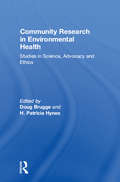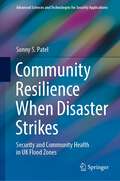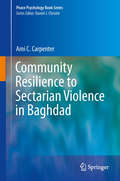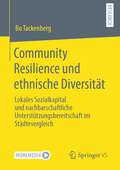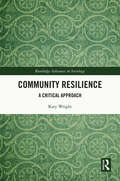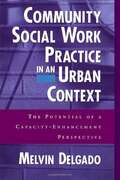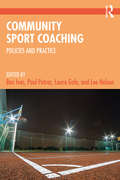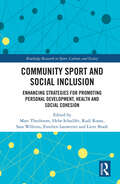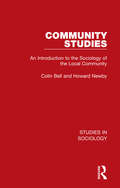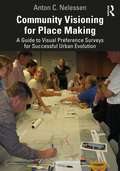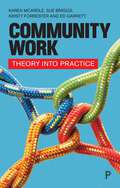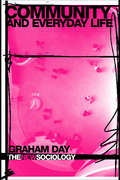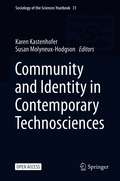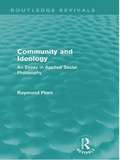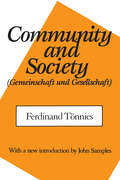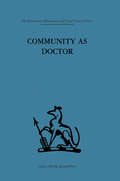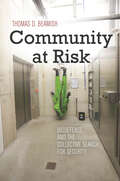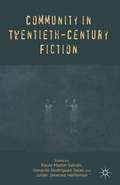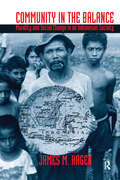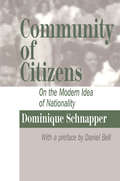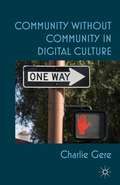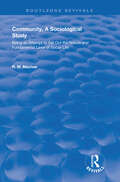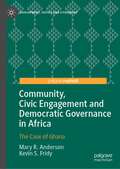- Table View
- List View
Community Research in Environmental Health: Studies in Science, Advocacy and Ethics
by H. Patricia HynesInterest in environmental health research conducted with community participation has increased dramatically in recent years. In this book, Doug Brugge and H. Patricia Hynes relate experience of multiple community collaborations across the United States and highlight the lessons to be learned for those involved in or embarking on community-collaborative research. The volume brings together a variety of cases, examining the nature and form that the collaboration took, the scientific findings from the work and the ethical issues that needed to be addressed. Actual cases covered include lead contaminated soil, asthma and housing conditions, the impact of development on environmental health, the impact of radiation hazards, urban gardening, hog farming and diesel exhaust. The concluding section analyses the experiences of those involved and puts their findings into broader context. Community Research in Environmental Health: Lessons in Science, Advocacy and Ethics provides a valuable guide for all those interested and involved in community research.
Community Resilience When Disaster Strikes: Security and Community Health in UK Flood Zones (Advanced Sciences and Technologies for Security Applications)
by Sonny S. PatelThis book addresses the operationalization of community resilience in the United Kingdom (UK) in connection with severe floods. Written for early academic professionals, students, and community practitioners, it investigates the educational and practical meaning and application of community resilience using a UK-centric local-level case study. Exploring the perceptions of both those who have been affected by a natural hazard and those who have not, the book reveals how trust, community resources, and neighborhood security can offer effective ways of bringing communities together after a natural hazard. The author introduces the topic of community resilience as it applies to disasters in Chapter 1 and its implications for securing and improving the wellbeing of disaster-affected communities in Chapters 2 and 3. In Chapter 4, the lessons learned contributing to the available information and research on community resilience are reviewed. Finally, the author offers recommendations and outlines future directions in coping with the uncertainty and insecurity caused by natural hazards in Chapter 5.
Community Resilience in Natural Disasters
by Diane Bretherton Anouk RideTold through the voices of local community leaders, this book analyzes how communities respond to natural disasters and how outsiders contribute positively - or negatively - to their response, promoting debate on the role of aid and the media in times of crisis.
Community Resilience to Sectarian Violence in Baghdad (Peace Psychology Book Series)
by Ami C. CarpenterThe recent conflict in Iraq evolved from an insurgency against the interim U. S. led government (the Coalition Provisional Authority or CPA) into a sectarian civil war. Violence became widespread, especially in areas of Baghdad City such as Sadr City, Al Amiriyah, and Al Adhamiya. However, a number of multiethnic neighborhoods in Baghdad successfully prevented sectarian attitudes and behaviors from taking hold. Four communities stand out in their self-organization to prevent the escalation of violence. This book looks at what makes these communities different from other areas within Baghdad. In-depth interviews in Sunni-dominant, Shia-dominant and Mixed neighborhoods generated a few key insights about conflict-resilience, or the capacity to prevent structural changes associated with conflict escalation. Key factors turned out to be the organization of non-sectarian self-defense groups, place attachment, collective efficacy, active intervention to de-escalate tensions, and also the presence of local religious leaders who forbid sectarian attacks. The continuity or strength of interpersonal relationships supported by the integrated physical structure of these neighborhoods and internal versus tribal conflict resolution mechanisms played a role as well. This volume examines the characteristics of the communities that have successfully prevented the rise of violence, and how they are able to maintain qualities of resilience to violent conflict.
Community Resilience und ethnische Diversität: Lokales Sozialkapital und nachbarschaftliche Unterstützungsbereitschaft im Städtevergleich
by Bo TackenbergAus einer soziologischen Perspektive widmet sich die Arbeit dem Konzept der Community Resilience, mit dem wesentliche Anpassungs- und Bewältigungsressourcen gesellschaftlicher Herausforderungen - wie Krisen, Katastrophen und sozialen Umbruchsphasen - in sozialen Prozessen und der kollektiven Leistungsfähigkeit der Bevölkerung verortet werden. Mittels Mehrebenenmodellierung wird untersucht, inwieweit ethnische Diversität und soziale Benachteiligung im Stadtteil Einfluss auf die Wahrnehmung lokalen Sozialkapitals und kollektiver Wirksamkeit sowie der nachbarschaftlichen Unterstützungsbereitschaft nehmen. Zudem wird untersucht, in welchem Verhältnis lokales Sozialkapital, kollektive Wirksamkeit und nachbarschaftliche Unterstützungsbereitschaft zueinander stehen.
Community Resilience: A Critical Approach (Routledge Advances in Sociology)
by Katy WrightThis book provides an alternative perspective on community resilience, drawing on critical sociological and social policy insights about how people individually and collectively cope with different kinds of adversity. Based on the idea that resilience is more than simply an invention of neoliberal governments, this book explores diverse expressions of resilience and considers what supports and undermines people’s resilience in different contexts. Focusing on the United Kingdom, it examines the contradictions and limitations of neoliberal resilience policies and the role of policy in shaping how vulnerabilities are distributed and how resilience is manifested.The book explores different types of resilience including planning, response, recovery, adaptation and transformation, which are examined in relation to different types of threat such as financial hardship, disasters and climate change. It argues that resilience cannot act as an antidote to vulnerability, and aims to demonstrate the importance of shared institutions in underpinning resilience and in preventing socially created vulnerabilities. It will be of interest to academics, students and well-informed practitioners working with the concept of resilience within the subject areas of Sociology, Social Policy, Human Geography, Environmental Humanities and International Development.
Community Social Work Practice In An Urban Context: The Potential Of A Capacity-enhancement Perspective
by Melvin DelgadoThe future of social work rests on how well it can address urban issues, particularly the needs of urban communities of color. Yet too many texts either focus exclusively on the problems these communities face or simply ignore their unique characteristics all together. Community Social Work Practice in an Urban Context aims to teach graduate students in social work how to create positive community environments in marginalized urban-based communities. Melvin Delgado's innovative and creative approach to urban social work practice shows students how to focus on the assets urban communities already have. Specifically, he suggests a capacity enhancement modelapproaching the adults and children of these communities through the arts and other positive community projects, such as community gardens, playgrounds, and murals. This model offers tremendous potential for unifying communities that consist of groups from very different cultural backgrounds. Social workers are in unique positions to use this model based upon their familiarity with communities and their exposure to issues related to oppression. This model also provides them with the opportunity to identify, engage, and plan services with communities. In turn, these projects are based upon a community's strengths and represent an effort to develop a community's capacity to help itself with assistance from professionals. Graduate students specializing in urban-focused social work will find this a fresh approach to a timely issue, particularly in community and macro practice courses. It not only shows students new and more positive ways to approach their urban clients, but it also provides them with a better way to address communities as a whole.
Community Sport Coaching: Policies and Practice
by Ben IvesIn many Western nations, community sport coaches occupy a central role in supporting the physical health, mental wellbeing, and wider social development of individuals and communities. However, there is no existing academic textbook that examines the policy contexts in which their work is located or, indeed, the challenges and opportunities that are an inherent feature of their everyday practice. Bringing together an international team of leading researchers in sport policy, sport development, sport pedagogy, and sport coaching, as well as some of the best emerging talents, this book is the first to critically consider a range of policy and practice issues directly connected to community sport coaching. Comprehensive, timely, and cutting-edge, no other text brings together in one place such a depth and breadth of scholarly material addressing this important field of endeavour. This book is an essential resource for educators, students, practitioners, and policy makers concerned with community sport coaching globally.
Community Sport and Social Inclusion: Enhancing Strategies for Promoting Personal Development, Health and Social Cohesion (Routledge Research in Sport, Culture and Society)
by Marc Theeboom Hebe Schaillée Rudi Roose Sara Willems Lieve Bradt Emelien LauwerierThis book examines sport as an inclusive and developmental environment, exploring the conditions by which community sport initiatives can promote personal development, health and social cohesion, particularly for at-risk youth. At the empirical core of the book is a multiple disciplinary study of community sport programmes in Flanders, Belgium, involving researchers from social sport sciences, social work, pedagogy and health care sciences. Drawing on this cutting-edge, realist research, the book considers the implications for sport development policy and practice around the world. The book considers community sport as a vehicle for promoting social inclusion, and the ways it allows people of all backgrounds and abilities to participate and access social and health benefits, whilst touching on key issues including monitoring and evaluation; exercise and health; youth welfare, and volunteering. This book is a fascinating reading for any student, researcher or practitioner working in sport for development, sport management, sport coaching, social work, education, sociology or urban studies.
Community Studies: An Introduction to the Sociology of the Local Community (Studies in Sociology)
by Colin Bell Howard NewbyOriginally published in 1971, this was the first text on community studies which analysed the major empirical work in this field in a comparative perspective. It is concerned both with the sociology of community and the sociology of community studies. It takes both the findings of individual studies and the research process itself as significant sociological data in their own right, and it asks continually: how do we know what we know about communities? Community Studies is, then, not only a contribution to that particular field but also to our understanding of the interaction between theory and method in sociology. Studies are analysed from North and Latin America, Britain and Western Europe, and India. Two central problems, stratification and power, are considered at greater length. This book would prove to be an invaluable introduction not only for students of sociology but also for architects, planners and all those who had an interest in the community at the time. Its authors were, and had been, actively engaged in field research in this area.
Community Visioning for Place Making: A Guide to Visual Preference Surveys for Successful Urban Evolution
by Anton C. NelessenCommunity Visioning for Place Making is a groundbreaking guide to engaging with communities in order to design better public spaces. It provides a toolkit to encourage and assist organizations, municipalities, and neighborhoods in organizing visually based community participation workshops, used to evaluate their existing community and translate images into plans that embody their ideal characteristics of places and spaces. The book is based on results generated from hundreds of public participation visioning sessions in a broad range of cities and regions, portraying images of what people liked and disliked. These community visioning sessions have been instrumental in generating policies, physical plans, recommendations, and codes for adoption and implementation in a range of urban, suburban, and rural spaces, and the book serves as a bottom-up tool for designers and public officials to make decisions that make their communities more appealing. The book will appeal to community and neighborhood organizations, professional planners, social and psychological professionals, policy analysts, architects, urban designers, engineers, and municipal officials seeking an alternative vision for their future.
Community Work: Theory into Practice
by Sue Briggs Karen McArdle Kirsty Forrester Ed GarrettWritten by community workers from diverse contexts, this highly accessible guide equips practitioners and students working in a range of community settings to make the best use of theory in their work. The book focuses on the hope, excitement and possibilities that contemporary theory brings to practice and is essential reading for all those concerned with social justice, inclusion and equality. Drawing on voices from across the world, influential thinking, both old and new, is applied to the practice that underpins work with individuals, groups and communities. The book will inform and enhance practice for a wide range of students and professionals working in community contexts such as community development, adult education, youth work, community health and social work.
Community and Everyday Life
by Graham Day'Community' continues to be a persistent theme in political, philosophical and policy debates. The idea of community poses fundamental questions about social inclusion and exclusion, particular versus general interests, identity and belonging. As well as extensive theoretical literature in the social sciences, there is a rich body of social research aimed at exploring the nature of community, and evaluating its contribution to people's lives and well-being. Drawing on a wealth of international empirical examples and illustrations, this book reviews debates surrounding the idea of community. It examines changing patterns of community life and evaluates their importance for society and for individuals. As well as urban, rural and class-based communities, it explores other contemporary forms of community, such as social movements, communes and 'virtual' gatherings in cyberspace. Truly multidisciplinary, this book will be of interest to students of sociology, geography, political science and social policy and welfare. Grounded in a wide-ranging review of empirical research, it provides an overview of sociological debates surrounding the idea of community and relating them to the part community plays in people's everyday conceptions of identity.
Community and Identity in Ancient Egypt
by Deborah VischakThis book examines a group of twelve ancient Egyptian tombs (ca. 2300 BCE) in the elite Old Kingdom cemetery of Elephantine at Qubbet el-Hawa in modern Aswan. It develops an interdisciplinary approach to the material - drawing on methods from art history, archaeology, anthropology, and sociology, including agency theory, the role of style, the reflexive relationship between people and landscape, and the nature of locality and community identity. A careful examination of the architecture, setting, and unique text and image programs of these tombs in context provides a foundation for considering how ancient Egyptian provincial communities bonded to each other, developed shared identities within the broader Egyptian world, and expressed these identities through their personal forms of visual and material culture.
Community and Identity in Contemporary Technosciences (Sociology of the Sciences Yearbook #31)
by Karen Kastenhofer Susan Molyneux-HodgsonThis open access edited book provides new thinking on scientific identity formation. It thoroughly interrogates the concepts of community and identity, including both historical and contemporaneous analyses of several scientific fields. Chapters examine whether, and how, today’s scientific identities and communities are subject to fundamental changes, reacting to tangible shifts in research funding as well as more intangible transformations in our society’s understanding and expectations of technoscience. In so doing, this book reinvigorates the concept of scientific community. Readers will discover empirical analyses of newly emerging fields such as synthetic biology, systems biology and nanotechnology, and accounts of the evolution of theoretical conceptions of scientific identity and community. With inspiring examples of technoscientific identity work and community constellations, along with thought-provoking hypotheses and discussion, the work has a broad appeal. Those involved in science governance will benefit particularly from this book, and it has much to offer those in scholarly fields including sociology of science, science studies, philosophy of science and history of science, as well as teachers of science and scientists themselves.
Community and Ideology: An Essay in Applied Social Philosphy (Routledge Revivals)
by Raymond PlantInitially published in 1974, this is a work of applied social and political philosophy which relates the philsophical analysis to various forms of community work theory and practice. Raymond Plant emphasizes that 'community' has a wide range of both descriptive meanings and evaluative connotations, linking this dual role of the word in the description and evaluation of social experience to its history in ideological confrontations. The book takes account of some liberal criticisms of the community ideal, and finally seeks to re-state a theory of community compatible with a liberal ideology.
Community and Society
by Ferdinand Tonnies C.P. LoomisThis extraordinary prescient work by Ferdinand Toennies was written in 1887 for a small coterie of scholars, and over the next fifty years continued to grow in importance and adherents. Its translator into English, Charles P. Loomis, well described it as a volume which pointed back into the Middle Ages and ahead into the future in its attempt to answer the questions: "What are we? Where are we? Whence did we come? Where are we going?" If the questions seem portentous in the extreme, the answers Toennies provides are modest and compelling. Every major field from sociology, to psychology, to anthropology, has found this to be a praiseworthy book. The admirable translation by Professor Loomis did much to transfer praise for the Toennies text from the German to the English-speaking world. Now, outfitted with a brilliant new opening essay by John Samples, the author of a recent full-scale biographical work on Toennies, 'Community and Society' is back in print; a welcome reminder of the glorious past of German social science.
Community as Doctor: New perspectives on a therapeutic community (Historical Issues In Mental Health Ser.)
by Rhona Rapoport Robert N. Rapoport Irving RosowTavistock Press was established as a co-operative venture between the Tavistock Institute and Routledge & Kegan Paul (RKP) in the 1950s to produce a series of major contributions across the social sciences. This volume is part of a 2001 reissue of a selection of those important works which have since gone out of print, or are difficult to locate. Published by Routledge, 112 volumes in total are being brought together under the name The International Behavioural and Social Sciences Library: Classics from the Tavistock Press. Reproduced here in facsimile, this volume was originally published in 1960 and is available individually. The collection is also available in a number of themed mini-sets of between 5 and 13 volumes, or as a complete collection.
Community at Risk: Biodefense and the Collective Search for Security
by Thomas D. BeamishIn 2001, following the events of September 11 and the Anthrax attacks, the United States government began an aggressive campaign to secure the nation against biological catastrophe. Its agenda included building National Biocontainment Laboratories (NBLs), secure facilities intended for research on biodefense applications, at participating universities around the country. In Community at Risk, Thomas D. Beamish examines the civic response to local universities' plans to develop NBLs in three communities: Roxbury, MA; Davis, CA; and Galveston, TX. At a time when the country's anxiety over its security had peaked, reactions to the biolabs ranged from vocal public opposition to acceptance and embrace. He argues that these divergent responses can be accounted for by the civic conventions, relations, and virtues specific to each locale. Together, these elements clustered, providing a foundation for public dialogue. In contrast to conventional micro- and macro-level accounts of how risk is perceived and managed, Beamish's analysis of each case reveals the pivotal role played by meso-level contexts and political dynamics. Community at Risk provides a new framework for understanding risk disputes and their prevalence in American civic life.
Community in Twentieth-Century Fiction
by Paula Martín Salván Gerardo Rodríguez Salas Julián Jiménez HeffernanThis book focuses on the imaginary construction and deconstruction of human communities in modern and contemporary fiction. Drawing on recent theoretical debate on the notion of community (Nancy, Blanchot, Badiou, Esposito), this collection examines narratives by Joyce, Mansfield, Davies, Naipaul, DeLillo, Atwood and others.
Community in the Balance: Morality and Social Change in an Indonesian Society
by James HagenCommunity in the Balance presents a fresh perspective on some classic social science issues. It examines the conflicts and tensions that permeate day-to-day interactions of a people in a remote region of the eastern Indonesian province of Maluku. The Maneo openly tout the pleasures of living alone in the forests of Seram away from the demands of kith and kin and the scrutiny that comes from life in villages in close proximity. The option is real. Yet while the incessant social demands and low-level enmities they attribute to village life are also felt, most acutely in the peril of sorcery, the accounts of strife are exaggerated to help establish the mutuality of the terms on which people do associate-as a collective sacrifice and virtue. Drawing on Aristotelian ideas of morality and exploring the modalities of recognition, desire, and displacement, the book focuses on the strategies of negotiation and obfuscation Maneo employ to foster community life. As volition is central to moral practice, the book's analysis of the subsequent religious conflagration that swept the province between 1999 and 2002 illuminates how fears and rumors of attack narrowed options that might otherwise have enabled enough people to opt out, condemn the violence, and perhaps contain it.
Community of Citizens: On the Modern Idea of Nationality
by Dominique SchnapperIn this critically acclaimed work, for which she was awarded the Prix de L'Assemblee Nationale in 1994, sociologist Dominique Schnapper offers a learned and concise antidote to contemporary assaults on the nation. Schnapper's arguments on behalf of the modern nation represent at once a learned history of the national ideal, a powerful rejoinder to its contemporary critics, and a masterful essay in the sociological tradition of Ernest Renan, Alexis de Tocqueville, Emile Durkheim, and Raymond Aron. If Schnapper asserts, the fate of liberal democracy is coterminous with that of the national ideal, then the nation's fate—and the answer to this question—must be of pressing interest to us all. Reflecting deeply on both the nation's past and future, Schnapper places her hopes in what she terms "the community of citizens."No mere exercise in sociological abstraction, Schnapper's case for the nation also entails a practical political objective. In a time of radical difference, the national ideal may be the last, great social unifier. This book deserves a place alongside the works of Elie Kedourie, Ernest Gellner, Anthony Smith, and other classics in the study of nationalism and nationality. This work will be of interest to sociologists, historians, and political scientists alike.
Community without Community in Digital Culture
by Charlie GereCommunity Without Community in Digital Culture presents the view that our digital culture is determined not by greater connection, but by the separation and gap that is a necessary concomitant of our fundamental technicity.
Community, A Sociological Study: Being an Attempt to Set Out the Nature and Fundamental Laws of Social Life (Routledge Revivals)
by Robert M. MacIverFirst published in 1917, this work seeks to be an introduction to the concept of community, the term which best expresses the object which social science as such endeavours to study; it is in community, the common life, that the interests represented by the specific social sciences are bound together, made integral, and thus amenable to a more comprehensive science. Community, A Sociological Study, includes an examination on the false perspectives of community, the elements of community, the structure of community and institutions.
Community, Civic Engagement and Democratic Governance in Africa: The Case of Ghana (Development, Justice and Citizenship)
by Mary R. Anderson Kevin S. FridyThis book explores how community influences civic engagement, focusing on the case of Ghana. It offers an interdisciplinary perspective to those studying psychology, political development and civic engagement in African countries. Previous research has shown that the social and economic context in which an individual interacts influences their political behaviors and attitudes, and that personal characteristics account for differences in political behavior and attitudes. This work moves away from the cultural demographics of a person, which often take center stage in existing investigations of partisan political behavior in the African context, and addresses the following five questions: (1) To what extent do individual traits influence civic engagement in Ghana? (2) To what extent is community identity similar or different in small rural villages versus large metropolitan areas in Ghana and how does community identity influence civic engagement? (3) To what extent does trust influence civic engagement in Ghana? (4) What factors and activities influence political knowledge and how does political knowledge influence civic engagement? (5) What is the status of women in civic engagement?
